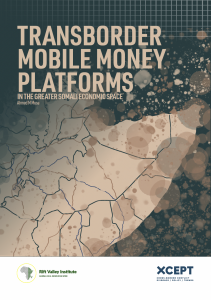SUMMARY
The informal transborder movement of goods and people have long captivated scholars, policymakers and security institutions in the East Africa region, in particular in the Horn of Africa (HoA). Special attention has been given to the transborder economic activities within what is referred to as the ‘greater Somali economic space’. This area encompasses Somali-inhabited territories in Somalia/Somaliland, Kenya, Ethiopia and Djibouti, where people have strong social and trade relations that predate de jure borders.
Authorities within the greater Somali economic space implement policies, regulations and controls based on various (at times competing) logics, including security, revenue mobilization and discouraging (although some authorities encourage) informal transborder economic activities. The sometimes unrealistic nature of these policy actions adversely affects people’s livelihoods and disrupts smooth transborder economic activity. As a result, these policies drive transborder economic activities into informality and legal ambiguity. This is especially the case for low and middle-income traders.
This leads them away from formal institutions and official border crossings and records. Instead, they rely on their social ties and institutions, which play a pivotal role in facilitating the operation of informal and legally ambiguous transborder economic activities. In the end, this informality fosters an inherent mutual mistrust between formal institutions and state actors on one side, and the borderland communities and those engaging in informal transborder activities, on the other. This study of transborder mobile money transactions and transfers (MMTs) in the greater Somali economic space is situated in relation to these dynamics.
This report is a product of the FCDO’s Cross-Border Conflict Evidence, Policy and Trends
(XCEPT) programme, funded by UK aid from the UK government. XCEPT brings together leading experts to examine conflict-affected borderlands, how conflicts connect across borders, and the factors that shape violent and peaceful behaviour. The programme carries out research to better understand the causes and impacts of conflict in border areas and their international dimensions. It supports more effective policymaking and development programming and builds the skills of local partners. The views expressed do not necessarily reflect the UK government’s official policies.




